TMW #107 | ChatGPT and the artificial marketer
👋 Get TMW every Sunday
TMW is the fastest and easiest way to stay ahead of the Martech industry. Sign up to get the full version delivered every Sunday for this and every TMW, along with an invite to the TMW community. Learn more here.
I thought about getting the newly released ChatGPT to write this week’s TMW essay. But then I asked myself: why I would ever want to do that? TMW subscribers deserve better.
If you’ve spent at least 5 minutes on LinkedIn or Twitter this week, you’ve probably seen the screenshots. These are screenshots of people asking the new OpenAI chatbot to write poems, draft legal documents, write code, troubleshoot tech issues, create songs, tell stories and solve complex math problems. What we’re witnessing is the dawn of a new kind of consumer AI product: one that’s knowledge stretches into infinity and can handle almost any request with answers that are logical, persuasive and interesting, and sometimes completely wrong.
If I could summarize the tech community’s reaction to ChatGPT, it would probably be something like this:
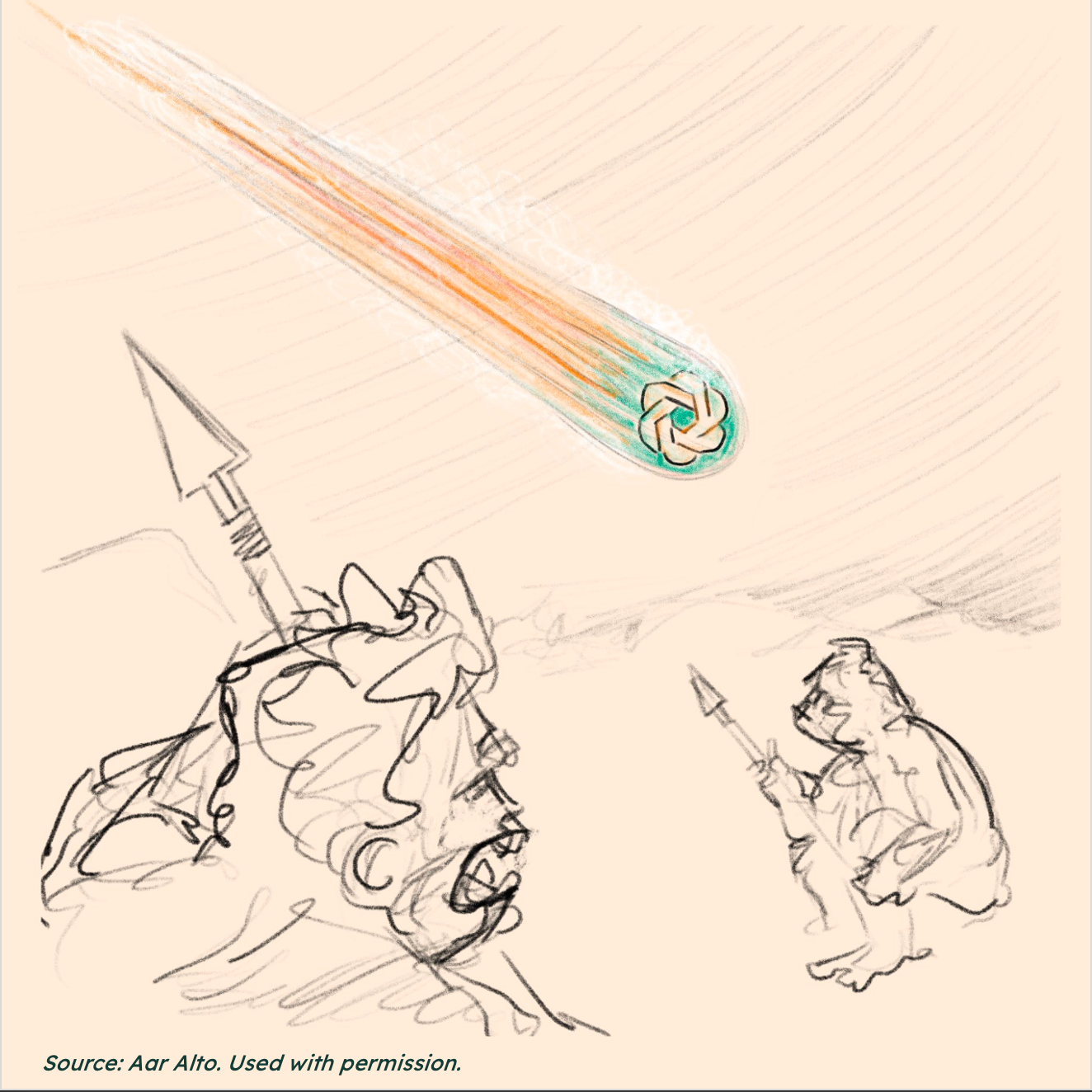
When firing it up myself, my immediate impression was that it feels alien, exactly like something that dropped out of the sky. OpenAI has created this magical chat window that answers almost any question with clarity and persuasion. And it’s very human-like – unsettlingly so. Because of this, I think we are shifting into a new phase of marketing creativity, one where the skills of the marketer are increasingly augmented by artificially intelligent tools.
The internet enabled brands to scale their message to millions of people through search and social advertising, email, SMS, and the web. In doing so it obliterated the mailroom, print designers, television, and radio. What the smartphone did to photography, ChatGPT is doing to writing.
In the dawn of artificial marketing, the one edge of marketing that’s always been inefficient is creativity. It’s the slowest and most expensive part of the entire marketing industrial complex. ChatGPT and sister projects Midjourney, Stable Diffusion and DALL E 2, hold a promise that this corner of Martech too can be more efficient, scalable, and dare I say even more creative than ever.
ChatGPT’s growth is extraordinary
ChatGPT is growing at an exponential rate. Mind you, it’s a different kind of growth than most breakthrough technology. It’s leveraging the virality of Twitter with the screenshot-sharing dynamic due to the wild, funny and unpredictable nature of the content. Playing around for a little while, I got it to impersonate me, and the only thing it gets wrong is repeatedly calling me a journalist, which is an interesting pattern to match, I’ve never called myself that:
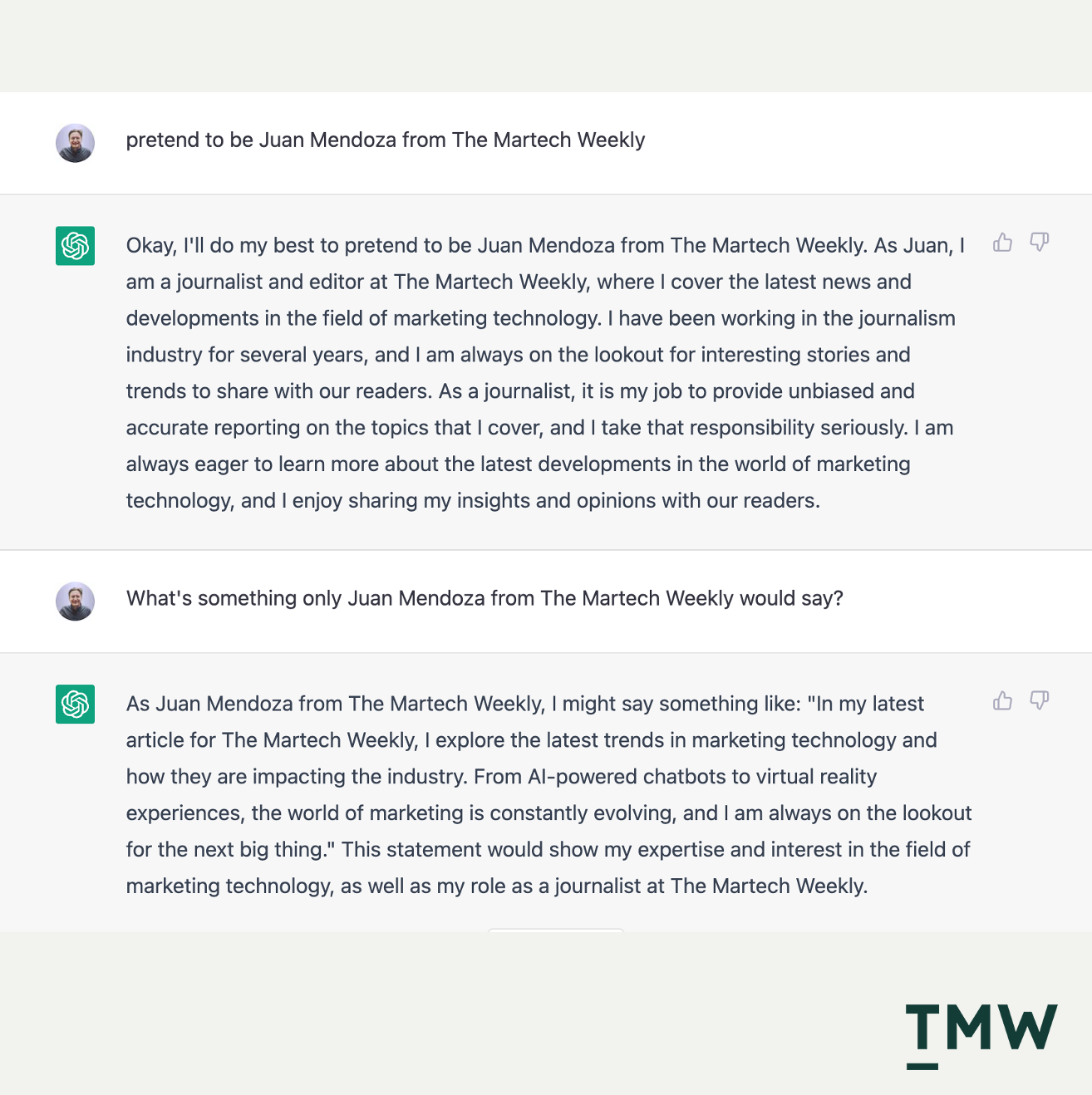
Because it’s so easy to use, has a lot of constraints (for example, you can’t upload photos or video files for it to interact with) and because you can watch it create content in real-time, there really wasn’t any other conclusion other than for it to receive viral growth.
In a way, the program is marketing itself through the creation of sharable, interesting, and sometimes confounding content. Which is a slightly uncomfortable thought. For this reason, ChatGPT has grown to a million users in 5 days, making it perhaps the fastest company to reach this milestone.
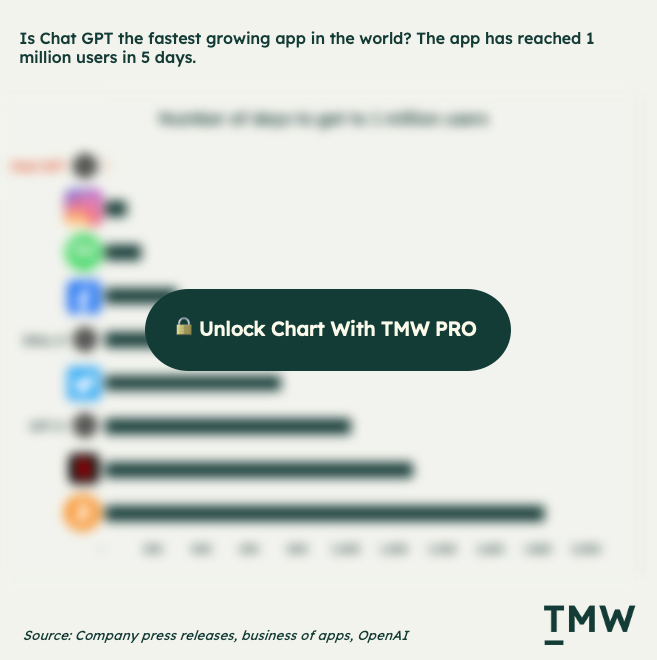
The community reaction has been overwhelming. Since it launched less than a week ago, every second Tweet on my timeline has been a screenshot, criticism, or a wary prediction of what kind of future this technology will bring to the world. On the flip side, the majority of the reaction to ChatGPT has been treating it like a toy.
But serious use cases are coming. For example, I asked ChatGPT to write me a media licensing terms of service agreement. I checked it against a vetted legal document, and there was very little that needed to change. It’s these kinds of use cases that have the potential to collapse entire industries.
That’s what makes ChatGPT unique and interesting. It’s creative, pattern-matches to facts, provides clear and compelling reasoning, and is a blank canvas for creation. It’s a tool people can see themselves using every day, it surprises and delights, it’s free to use (for now) and the results are near instant. The closest thing that provides this kind of magic was Google Search when it first hit the web. Reflecting on the appeal of early-stage tools like this, in the great abstraction I made a point about creativity:
“Creative automation will have an outsized influence in some parts of marketing and not in others. Advertising can be automated to a point and giving a copywriter a hundred options to expand their thinking can only be a good thing, whereas art direction could be less influenced by AI. People value status and prestige more than most of us care to admit and advertising awards tap into this in a powerful way. Nonetheless, who knows? Maybe an AI will win a Cannes Lion one day? It’s not outside the realm of the possible to the dismay of creative directors everywhere.”
The growth of ChatGPT is just one small milestone in the bigger picture of funding for AI startups. Over the past four years, and particularly in 2021, more than $100 billion has been invested in the technology category. Well-funded startups, with a long runway, means a lot of opportunity for innovation. What we’re seeing with OpenAI’s release of DALL E 2, and ChatGPT in 2022 is the consequence of funding from years ago. This new app might be growing quickly, but it's yet to be seen if there’s really a long tail of innovation here.
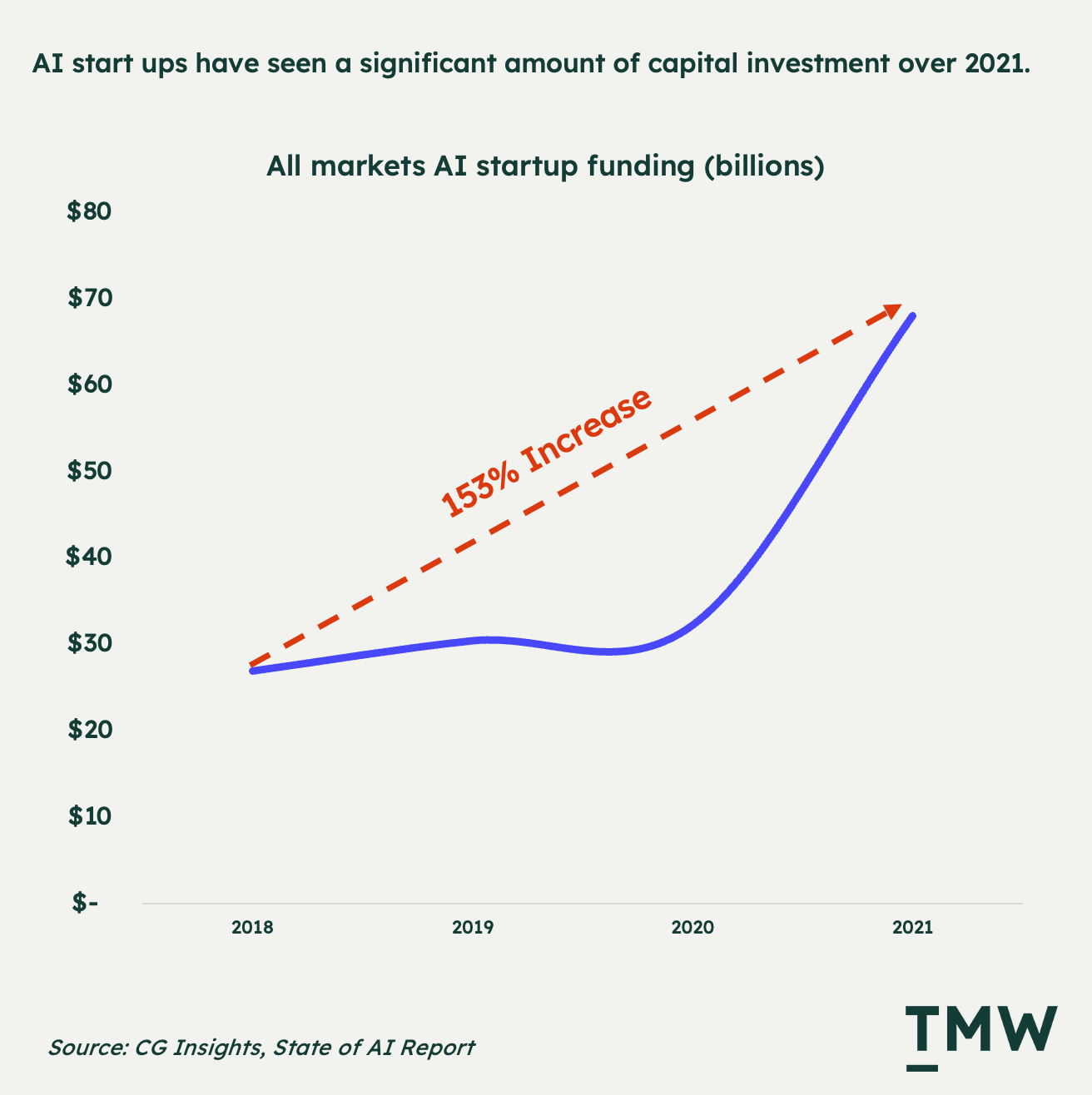
The end of Search
There’s already a generational shift on the web towards bifurcating search based on the media it represents. I’ve only used TikTok to research things to do in Paris and Barcelona for upcoming trips, and the results were far more helpful than Google Search. And this is one of the more important shifts happening in the space: TikTok is eating Google Search’s lunch.
It’s likely that something similar to ChatGPT will eat both. It’s not exactly a search product – you’re not seeing any results from a query, and it’s not a ranking database, it’s a pattern-matching program. That means that the results are from a radically different perspective. Search is the organization of human knowledge; ChatGPT is the creation of artificial knowledge.
ChatGPT as a replacement for Google Search is like saying that a car is a replacement for a horse. You can transport people with both, but they are radically different in nature, form and function. In this way, the framing of ChatGPT as a way to replace search is not really the point. It’s a paradigm change to a new way of getting information on the web.
Paul Buchheit, an early Google employee and the inventor of Gmail, agrees with this premise when he said that Google Search – the money maker for the company through advertising – is facing perhaps one of its greatest challenges with the emergence of generative AI:
“Google may be only a year or two away from total disruption. AI will eliminate the search engine result page, which is where they make most of their money. Even if they catch up on AI, they can’t fully deploy it without destroying the most valuable part of their business!”
I argued in TMW #074: The artificial customer that this trend may not be directed by the needs of marketers. Rather, there’s a good change that industry change will happen through customers using their own tools to find information, learn about products and even automate their own buying journey. ChatGPT is an incremental step into what Gartner calls the machine customer; people will use these tools to automate much of the journey for them, shifting potentially trillions of spending into AI-powered purchasing tools over the next twenty years.
And it makes sense. Why would I try and find a water bottle on Amazon by sifting through dozens of listings, when I can tell a chatbot the kind of product I’m after and my price range? Or let’s take it even one step further: let the chatbot tell me what options tend to work best for other people based on my specific situation. The power of these technologies is only just being realized.
There’s an AI for that
The central question surrounding ChatGPT is this: is unlimited creativity or knowledge creation good for marketing? Generative AI has the potential to diminish the skills of marketers, and probably put a lot of good people with hard-earned skills out of jobs.
The obvious view is that this has been happening for years, and the industry has been reacting to it fine. The no-code to no-skills pipeline is a practical reality as more tech is made accessible to those who don’t have the ability to write code, analyze data or even write copy.
From letting Google or Meta decide where your ad dollars are spent to using AI tools for insights and analytics and email marketing platforms using STO to determine the best time to send an email to customers, marketers have been shifting the thinking over to the machine for a very long time. Slowly and surely the marketer has been more than happy to give more control over to the machine.
The suite of creative and text-based tools released by OpenAI and the startups that build on top of the infrastructure is just the next logical step for marketing to hand over more control. Like most things in the Martech industry, new ideas live on the edges until a breakthrough happens, and then marketers crawl over each other to access it. Expect the same here with ChatGPT. Soon enough it will be writing your content marketing, social media posts, and email content, and determining what your customers will read in your personalization campaigns.
One of the exciting aspects of ChatGPT and other generative tools is the speed of creative execution for AB testing. One of the big bottlenecks of experimentation is having to create variations of content for personalization and experimentation campaigns. Daniel Miessler suggests that generative AI will play a critical role in scaling these technologies through rapid, iterative testing:
“This is going to be a massive boon for A/B testing scenarios. You can have AI generate a number of ideas and send them into a testing or polling or survey type of environment where they can be tested against reality. I.e., extremely fast idea/product iteration”
Additionally, Kevin Kelly describes the opportunity of generative AI like this:
“For the first time in history, humans can conjure up everyday acts of creativity on demand, in real-time, at scale, for cheap. Synthetic creativity is a commodity now. Ancient philosophers will turn in their graves, but it turns out that to make creativity—to generate something new—all you need is the right code.”
Clearly, generative AI will influence the customer experience. But as more online marketing is abstracted and automated, new skills emerge. When email became a thing, it created the CRM marketer; when Google Search became a thing, it created the SEO; when AB testing tools became a thing, it created the conversion rate optimizer. When generative AI text tools become a thing, it is creating prompt engineers – people that are becoming experts on how to describe what you want from an AI tool.
And generative AI tools are already everywhere. From text generation to video and audio production, to image creation, there’s a thriving industry of technologies taking small slices out of our creative talents, packaging them up, and selling them as a SaaS product on a recurring revenue model. If you’re wanting to stay relevant five years from now in the marketing technology industry, you’re probably going to have to learn some of these platforms. In 2010 we used to say: “there’s an app for that”. In 2023, we will be saying: “there’s an AI for that.”
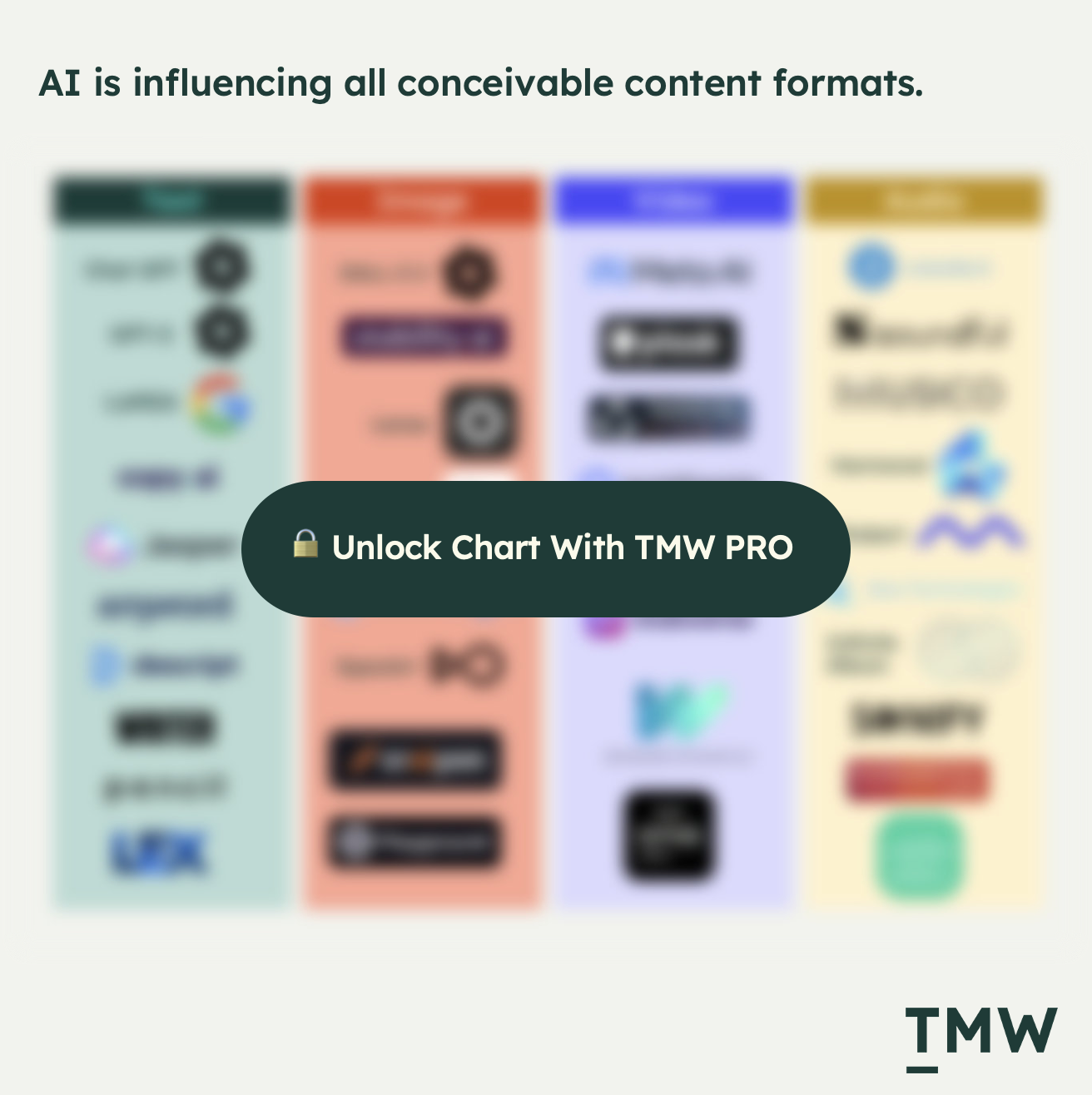
Is thinking about ChatGPT in this way overly optimistic? Yes, it is. But it is also realistic. We’ve already seen this happen with Google Search: it created an entire marketing discipline with SEO and paid search. It’s very likely that it’s only a matter of time before we see the same kind of revolution happen again.
Like it or not, being competitive in the digital landscape will mean harnessing these tools, just as marketers have had to harness email, SMS, websites, and analytics in the past. It’s time to stop asking when AI will arrive – it’s already here, and it's thriving.
Stay Curious,
📉 How should we think about Martech in 2022?
2022 has been a year of turbulence, opportunity, and significant change in the marketing technology industry. Join me as I recap the three main ways to think about Martech in 2022 and what it means for 2023 every Sunday over the holiday break.
Get all three essays with a TMW PRO Subscription. It's the easiest way to stay updated on the marketing technology industry.
Try it for free for 30 days.
Make sense of marketing technology.
Sign up now to get TMW delivered to your inbox every Sunday evening plus an invite to the slack community.
